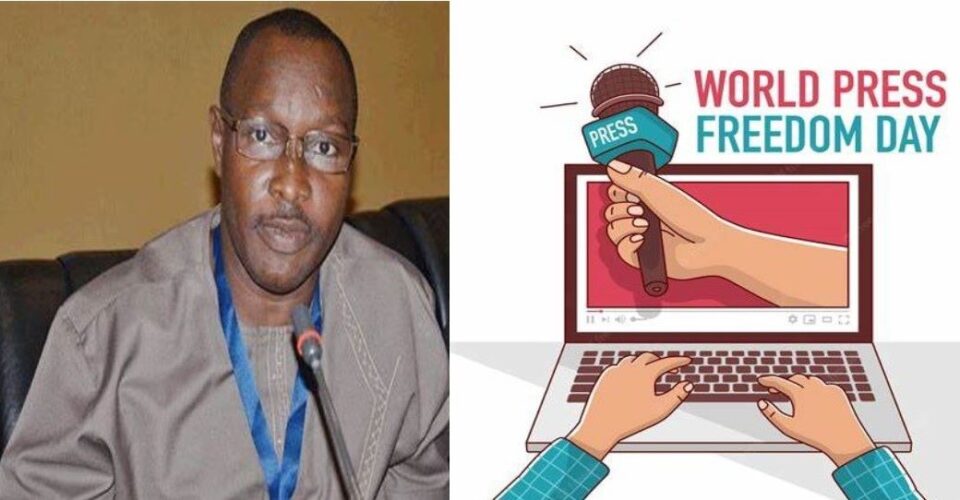PHOTO: Malcolm W. Jospeh, CEMESP Executive Director
Ahead of World Press Freedom Day this Saturday, May 3, 2025, the Center for Media Studies and Peacebuilding (CEMESP) has underscored “the indispensable role of independent journalism in addressing global and national issues including the climate crisis.”
In a statement to mark the day, CEMESP says in Liberia, “the observance of this day is marred by growing concerns over the state of press freedom and freedom of expression under the administration of President Joseph Nyuma Boakai.”
BELOW IS FULL TEXT OF THE PRESS STATEMENT:
PRESS STATEMENT
Issued by the Center for Media Studies and Peacebuilding (CEMESP)
Monrovia, Liberia |May 3, 2025
Observing World Press Freedom Day 2025:
A Call for Genuine Commitment to Media Freedom and Expression in Liberia
On the occasion of World Press Freedom Day 2025, the Center for Media Studies and Peacebuilding (CEMESP) joins national and international partners in commemorating this critical day under the global theme: “A Press for the Planet: Journalism in the Face of the Environmental Crisis.”
This theme underscores the indispensable role of independent journalism in addressing global and national issues including the climate crisis while reaffirming the need for an environment that guarantees the safety, independence, and sustainability of the media.
In Liberia, the observance of this day is marred by growing concerns over the state of press freedom and freedom of expression under the administration of President Joseph Nyuma Boakai. Despite the democratic promises made by the current government, several incidents have underscored the fragility of media freedom in Liberia:
Security personnel have failed to take action or have even been complicit in incidents of violence against journalists, creating a climate of fear and impunity.
Over the past year, Liberia has witnessed a troubling increase in incidents of intimidation, threats, and violations against journalists and media institutions.
In February 2025, journalist Philibert Browne, publisher of the Hot Pepper newspaper, was summoned and interrogated by the National Security Agency (NSA) over a story involving alleged corruption in government, raising serious concerns about attempts to muzzle investigative journalism. Similarly, in November 2024, reporter Franklin Doloquee of FrontPage Africa was assaulted in Nimba County by individuals believed to be linked to a local government official, simply for reporting on alleged mismanagement of public funds. To date, no one has been held accountable for the attack.
Media institutions have not been spared. In September 2024, the offices of Spoon Network, a vocal independent broadcaster, were vandalized following a series of critical commentaries on government inefficiencies. The Liberia National Police failed to conduct a credible investigation, reinforcing perceptions of state tolerance for reprisals against dissenting media voices. These and other incidents form part of a growing pattern of repression that threatens to undermine Liberia’s democratic gains and erodes the constitutional right to freedom of expression and of the press.
These actions not only undermine the constitutional guarantees of freedom of expression and the press, but they also erode public trust in the government’s commitment to transparency and accountability.
CEMESP, however, acknowledges some positive steps taken in the past year:
The increased engagement of civil society with media stakeholders in promoting safety for journalists.
The reactivation of multi-stakeholder dialogue on the reform of media laws and policies.
The continued vibrancy and resilience of community radio stations and independent outlets, which remain key pillars of access to information for the Liberian people.
On this occasion, CEMESP urgently calls on the Government of President Joseph Nyuma Boakai to recommit to safeguarding press freedom and freedom of expression. Specifically, we urge the government to:
- Guarantee the safety of journalists and investigate all attacks against the media without bias or delay.
- Transform the Liberia Broadcasting System (LBS) from a state-controlled mouthpiece to a truly independent public service broadcaster that serves all Liberians.
- Expedite the passage of key legislative reforms, including:
The Independent Media Commission Bill to ensure a transparent and accountable media regulatory body;
The Community Radio Sustainability Bill to support the lifeline of rural and grassroots media;
The Data Protection Bill to uphold privacy and enhance journalistic integrity in the digital age.
These actions are vital not only to Liberia’s democratic credentials but also to addressing the broader theme of this year’s World Press Freedom Day. A free and independent press is essential in amplifying voices on environmental justice, holding polluters accountable, and educating the public on sustainable solutions.
As Liberia stands at a crossroads, CEMESP reminds all stakeholdersespecially those in government, that democracy thrives where the press is free, independent, and empowered to speak truth to power without fear.
Signed:
Malcolm W. Joseph
Executive Director
Center for Media Studies and Peacebuilding (CEMESP)
Monrovia, Liberia

